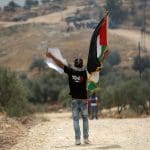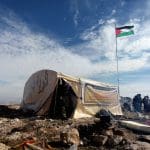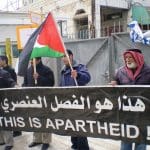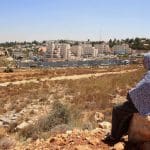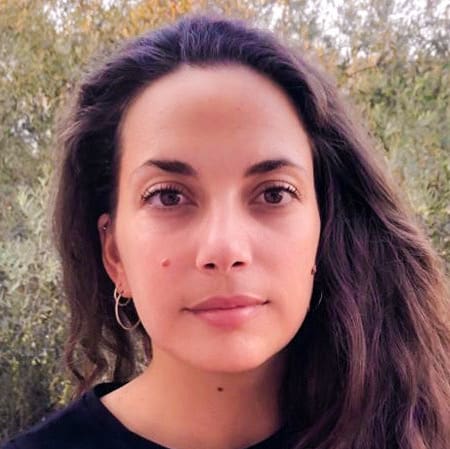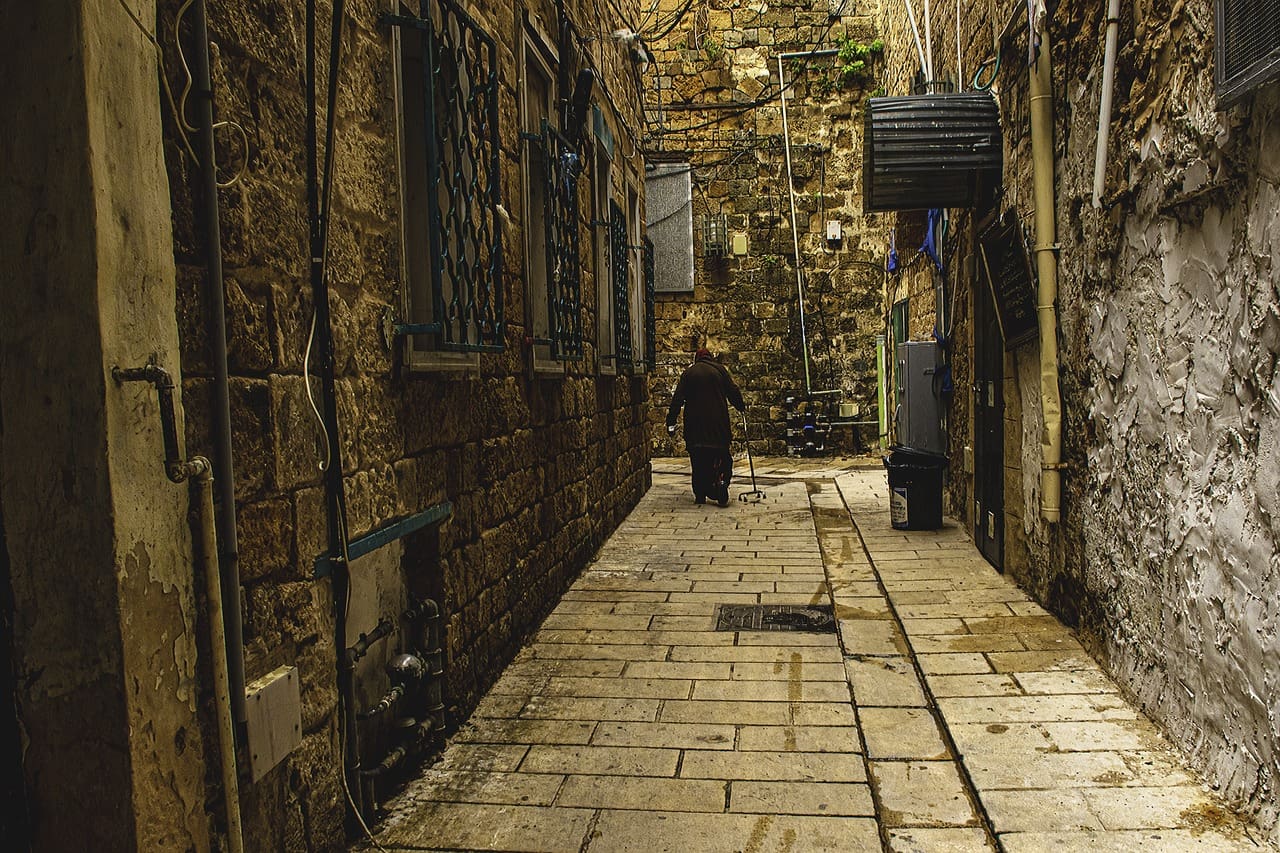
Executive Summary
Key figures in the international arena have described the situation in the West Bank as apartheid, citing such characteristics of segregation as settler-only roads, fortified settlements, and the separation wall. More recently, prominent voices have applied the term to the situation of the Palestinian citizens of Israel.
Although the Palestinians who remained within the state of Israel after 1948 were given Israeli citizenship, citizenship is not a mechanism of inclusion. This is because in Israel, unlike in most countries, citizenship and nationality are distinct terms and categories. Because the state defines itself constitutionally as Jewish, those with Jewish nationality trump the non-Jewish (mostly Palestinian) population.
Most Palestinian citizens of Israel live in Arab-only villages and towns, which suffer from severe overcrowding. Not a single new Arab town or village has been built since 1948, and if Palestinians leave their towns and villages of origin, they are restricted from purchasing or leasing land.
Within the 1948 borders the state attempts to subdue Palestinians through a segregated education system. Jewish Israeli schools are given autonomy in regard to their curriculum, while the Ministry of Education devises Palestinian schools’ curriculum. This curriculum focuses almost entirely on Jewish history, “values,” and culture, with no reference to Palestinian/Arab history. The narrative of the Nakba is absent – and in fact outlawed.
Though Palestinian political participation in the Knesset is often cited as an example of the state’s plurality and democracy, since 1948 no Arab party has been included in a ruling coalition, and only a few Palestinian citizens have been appointed to ministerial positions.
The Nakba divided the Palestinian people into three fragments: the Palestinian citizens of Israel, the Palestinians in the West Bank and Gaza, and the Palestinians in exile. This fragmentation is the main method through which Israel imposes apartheid on the Palestinian people. It is therefore important to generate strategies for using the apartheid analysis and challenging such fragmentation.
Policy recommendations
- For those working in international law and policy analysis, pursuing Palestinian rights within the framework of military occupation, particularly the recognition of the Green Line, should not be forsaken. However, Palestinian policymakers and civil society actors must also emphasize that Palestinian citizens of Israel and Palestinian refugees are not separate from the overall Palestinian struggle.
- Palestinian leaders must build on the work already underway by various NGOs that mainly focuses on bringing Palestinian youth from the fragmented communities together.
- The Future Vision Documents, published in 2006-2007 and emerging from a collective Palestinian effort, laid out the social and political demands of the Palestinian community in Israel. Expanding this vision across the Green Line and beyond, and transforming it into a demand to end apartheid and enforced fragmentation, must take a central role in the Palestinian liberation struggle.
Overview
Key figures in the international arena have described the situation in the West Bank as apartheid, citing such characteristics of segregation as settler-only roads, fortified settlements, and the separation wall. In his 2006 book Peace Not Apartheid, former US President Jimmy Carter applied the term specifically to the Occupied Palestinian Territory (OPT), while John Kerry in 2014 warned that Israel “could” become an apartheid state should the two-state solution fail to materialize.
However, more recently prominent voices have applied the term to the situation of the Palestinian citizens of Israel. Jodi Rudoren, former New York Times Jerusalem bureau chief, said: “I…think the issue of apartheid is more relevant to how Arab Israelis [Palestinian citizens of Israel] are treated within the framework of [Israel].” The UN Economic Social Commission for Western Asia (ESCWA) published a report earlier this year stating that Israel, from the very beginning, “has established an apartheid regime that dominates the Palestinian people as a whole” – meaning Palestinians not only in the OPT, but those in exile as well as in Israel proper.1
This policy brief examines the apartheid analysis as it applies to the Palestinian citizens of Israel, with a particular focus on citizenship, land, education, and politics. It concludes with strategies for how such analysis can be used to further the rights of the Palestinian citizens and contribute to countering fragmentation among the Palestinian people as a whole.
Apartheid and Its Beginnings
Customary international law and the Rome Statute of the International Criminal Court define apartheid as “inhumane acts…committed in the context of an institutionalized regime of systematic oppression and domination by one racial group over any other racial group or groups and committed with the intention of maintaining that regime.”
Although many associate apartheid with South Africa, the definition is universally applicable and thus challenges the misconception that apartheid was an exceptional case that has since ended. The definition also allows an understanding of apartheid as a system that can adopt various characteristics and manifest itself in various ways, including economic (see Rethinking Our Definition of Apartheid, which argues that apartheid is not yet over in South Africa).
While 750,000 Palestinians were expelled from the borders of the newly established Jewish state in 1948, 150,000 Palestinians survived and were placed under martial law for nearly 20 years. This period, known as military rule, was based on the 1945 Emergency Regulations introduced by the British Mandate authorities, who used it to monitor Palestine’s Arabs. The mechanisms limited all aspects of Palestinian life within the new state, including freedom of movement and political expression.
In Israel, unlike in most countries, citizenship and nationality are distinct terms and categories Share on XThis period saw a mass appropriation of land, conducted through the Absentee Property Law passed by the Knesset in 1950. The law continues to be the main vehicle through which Israel confiscates land, including in East Jerusalem.2 It allowed the state to seize property from any person who had left their place of residence between November 29, 1947 and May 19, 1948. This law and others, including those comprising the Basic Law – which serves as Israel’s constitution to this day – codified apartheid into the legal system. These laws also affirmed Israel’s foundational doctrine of Jewish dominance in a Jewish state, with inequality for all others.
Though military rule was lifted in 1966, the Palestinian community remained a demographic and potential political threat to the nature of the state. Israel therefore maintained both segregation and marginalization of Palestinians. Today, the Palestinians of Israel number 1.5 million, one fifth of the total population. There have been no attempts to assimilate them into the settler structure, as with other cases of settler-colonial regimes. The focus on Israel having an exclusively Jewish nature has left its Palestinian citizens on the margins, yet they continue to survive.
Citizenship as a Mechanism of Apartheid
It is often said that Palestinians in Israel are “second-class” citizens, yet this phrase does not reflect reality. Although the Palestinians who remained within the borders of the new state were given Israeli citizenship, from the outset it has not been used as a mechanism of inclusion. This is because in Israel, unlike in most countries, citizenship and nationality are distinct terms and categories. While there is such a thing as Israeli citizenship, there is no Israeli nationality; rather, nationality is designated along religious/ethnic lines. Israel demarcates 137 possible nationalities, including Jew, Arab, and Druze, which are recorded on identity cards and in registry databases. Yet because the state defines itself constitutionally as Jewish, those with Jewish nationality trump the non-Jewish (mostly Palestinian) population.
As the Jewish nation and the state of Israel are considered one and the same, the exclusion of non-Jewish citizens is a consequence. The ESCWA report explains that the differentiation between citizenship and nationality allows for a sophisticated and covert racist system not necessarily detectable to the unknowing observer. The system divides people into two categories (Jews and non-Jews), embodying the very definition of apartheid. Palestinian citizens are thus designated as “Israeli Arabs,” a term that has become commonplace in mainstream media. In addition to serving as part of the binary exclusion mechanism, this term attempts to negate these citizens’ Palestinian identity while allowing Israel to portray itself as a diverse and multicultural state. This plays out in access to land, housing, and education, as will be discussed below.
Both Palestinian citizens and Israeli Jews have challenged the issue of citizenship and nationality in Israeli courts several times. While Palestinians have done so in an attempt to gain full rights within the state, Israeli Jews have usually sought to relinquish ethnic and religious identity. Thus far the Israeli Supreme Court has rejected all petitions to change the law on the basis that Israeli nationality would technically open up inclusion for non-Jewish citizens and would challenge the Zionist underpinning of Israel as a Jewish nation state.
Segregation and Land Deprivation
Spatial organization within Israel also demonstrates apartheid. Most Palestinian citizens of Israel live in Arab-only villages and towns, with only a few living in “mixed cities.” Such segregation is neither accidental nor a “natural” residential pattern. A cursory examination reveals Israel’s aim of squeezing as many Palestinian Arabs into as little land as possible.
Villages that survived ethnic cleansing in 1948 saw much of their land appropriated, and expansion since has not been permitted. As a result, these Arab villages and towns suffer from severe overcrowding, with no opportunity for relief through development or growth. Further, not a single new Arab town or village has been built since 1948.
If Palestinians leave their towns and villages of origin, they are restricted from purchasing or leasing land through two main mechanisms: admission committees and Jewish National Fund (JNF) and state authorities’ discriminatory policies. Rural communities are permitted to establish admission committees that assess the “social suitability” of potential residents, paving the way for Palestinian applicants to be rejected “legally” because they are not Jewish. The High Court has upheld this practice despite challenges against it.
Not a single new Arab town or village has been built since 1948 Share on XThe Israeli Lands Authority (known as the Israeli Lands Administration until 2009) was charged from the outset to maintain the Jewish National Fund mandate to act as a custodian of the land of Palestine for the Jewish people and to operate in accordance with the World Zionist Organization-Jewish Agency Status Law of 1952, whose main function is the gathering and settling of world Jewry in Israel.
Urban and rural planning and organization of space thus maintains dominance of the Jewish character of the state and supports the Zionist narrative. The goal of the National Master Plan of Israel, formulated according to the 1965 Planning and Building Law, reaffirms this policy: “To develop spaces in Israel in a way which allows the realization of the goals of Israeli society and its varied components, the realization of its Jewish character, the absorption of Jewish immigrants and maintaining its democratic character.”
This ideology and the policies that support it have had devastating consequences for Palestinian spaces in the 1948 borders. In the Galilee, where Palestinians are the majority, the Israeli government has made determined attempts to “Judaize” the region. These include encircling Palestinian villages with Jewish settlements to prevent geographical contiguity – revealing the state’s preoccupation with demographics, particularly its fear of the increasing Palestinian population. This Israeli preoccupation has also played out through continuous displacement and forced relocation of tens of thousands of Palestinian Bedouins in the Naqab (Negev).
Up to 90,000 Bedouins live in “unrecognized villages,” meaning that Israel considers these villages illegal and their residents “trespassers” on state land. The classification of “illegal” stems first from the fact that many of the villages predate the establishment of Israel, and Bedouin custom determined land ownership. In regard to the remaining villages, Bedouins established them after being expelled from ancestral lands in 1948, and the villages are not “authorized” by the state. In this way, Israel claims legality in order to deprive many Naqab Bedouins of basic services such as water and electricity, and in many cases, demolishes villages.
That Palestinians and Jews live in segregated spaces makes it easier for Israel to deprive services to Palestinians elsewhere within the 1948 borders. The quasi-governmental organizations that deal with resource allocation aid such deprivation. These organizations are Jewish or Zionist bodies, including the Jewish Agency and the World Zionist Organization, and their mandate is to serve the Jewish people and to maintain the Zionist character of the state. As a result, they deny Palestinians resources in the same way Palestinians are denied space, on the basis of not being Jewish. Although many countries have unequal and unfair resource and land distribution, rarely are such policies enshrined in law so explicitly as in Israel.
Maintaining the Regime
Israel maintains this apartheid regime through various methods of external and domestic control. Within the 1948 borders the state attempts to subdue Palestinians from the beginning of their existence through the education system. Established during military rule, the state school system placed Palestinian children and Jewish Israeli children into separate schools. Ben Gurion University of the Negev Professor of Education Ismael Abu-Saad has argued that while the formal structures of the military regime have since changed, the strategy to use “education as a tool for political purposes has endured and continues to define the educational experience of indigenous Palestinian Arab students in Israel today.”
This political strategy involves controlling the curriculum to suppress Palestinian identity and to prevent mobilization against the state. Palestinian schools are also very under-resourced: Less than a third of what is spent on Jewish Israeli pupils is spent on Palestinian pupils. This lack of resources not only demonstrates the gross inequalities between the two categories of citizen, it also hinders Palestinian children’s opportunities later in life.
Fragmentation is the main method through which Israel imposes apartheid on the Palestinian people Share on XJewish Israeli schools are given a large amount of autonomy in regard to their curriculum, while the Ministry of Education devises Palestinian schools’ curriculum. It is thus unsurprising that the curriculum in Palestinian schools focuses almost entirely on Jewish history, “values,” and culture, with no reference to Palestinian/Arab history. The narrative of the Nakba, as Palestinians call the catastrophe of their dispossession in 1948, is absent – and in fact outlawed. Israel’s Budget Foundations Law, colloquially known as the “Nakba Law,” authorizes the finance minister to reduce or eliminate state funding to any institution that commemorates the Nakba or marks Israeli Independence Day as a day of mourning. This includes schools, NGOs, and village municipalities. The denial of this crucial aspect of Palestinian history attempts to sever Palestinians from a collective identity in which the Nakba plays a key role.
While Palestinians can make limited gains within the Israeli legal system through lawsuits or appeals, they are not able to seriously challenge the racial regime. And though Palestinian political participation in the Knesset is often cited as an example of the state’s plurality and democracy, since 1948 no Arab party has been included in a ruling coalition, and only a few Palestinian citizens have been appointed to ministerial positions. Candidates to the Knesset may be rejected if they deny the existence of Israel as a Jewish and democratic state, making political participation in Israel premised on accepting that the state is for the Jewish people and that Palestinians’ existence within the state will never be equal to that of their Jewish counterparts.
Political mobilization against the regime has therefore been pursued outside of institutional politics, within either civil society or activist circles, both of which are under constant surveillance and harassment. Adalah, the Legal Center for Arab Minority Rights in Israel, has documented the state’s systematic arrest and harassment of key civil society actors and political activists. Similarly, the state often violently suppresses demonstrations, most notably in October 2000 when 13 unarmed Palestinian citizens were shot and killed for protesting in solidarity with Palestinians in the West Bank and Gaza Strip.
Despite such callous and violent practices, Israel maintains an image of a liberal, multicultural democracy – an ally to the West in an otherwise hostile region. It portrays Zionism as a Jewish national liberation ideology rather than the foundation of a settler colonial regime that upholds a system of apartheid. Israel has also managed to shape the discussion on what constitutes Palestine and who constitutes a Palestinian.
Indeed, the Nakba divided the Palestinian people into three fragments: the Palestinian citizens of Israel, the Palestinians in the West Bank and Gaza, and the Palestinians in exile (the refugees). Israel and various international peace processes, including the Oslo Accords, have continued to solidify this fragmentation through the purposefully limited understanding of Palestine as the “Occupied Palestinian Territories” – and the Palestinian people as only those within those territories. This fails to acknowledge the Nakba as part of the Palestinian story and thus removes both the Palestinian citizens of Israel and the Palestinian refugees in exile from the Palestinian liberation struggle. The ESCWA report stresses that this fragmentation is the main method through which Israel imposes apartheid on the Palestinian people. It is therefore important to generate strategies for using the apartheid analysis and challenging such fragmentation.
Apartheid Analysis as a Strategy for Securing Rights for All Palestinians
The term “apartheid,” undoubtedly because of its serious political and legal implications, has yet to enter the realm of mainstream media or policy in regard to Israel and Palestine. It has only been occasionally applied to the situation of the West Bank. Indeed, the ESCWA report, with its conclusion that Israel practices apartheid on the entire Palestinian population, was pulled shortly after it was published following immense pressure from the US and Israel.
Nonetheless, the apartheid analysis can be used strategically to counter the fragmentation of the Palestinian people and to further Palestinian rights, including those of the Palestinian citizens of Israel. There are several reasons why the apartheid analysis is particularly beneficial in this regard.
First, international law provides a universal template and definition of the term, which recognizes that apartheid can take different forms. An understanding of apartheid is therefore not limited to that of the regime in South Africa. Apartheid is also a legally enshrined mechanism practiced and maintained through the state. As such, the problem lies not with the political party or politicians that sit in government, but rather the constitutional foundation of the state itself. Finally, the apartheid analysis recognizes that Israel’s regime of oppression and discrimination not only affects all the fragments of Palestinian society, but in fact depends on that fragmentation. Therefore, long-term solutions to the violation of Palestinian rights must take into account each segment of the Palestinian people, not simply Palestinians in the West Bank and Gaza Strip.
The problem with apartheid lies with the constitutional foundation of the state. Share on XBuilding on these strengths offers some possible strategies. For those working in international law and policy analysis, pursuing Palestinian rights within the framework of military occupation, particularly the recognition of the Green Line, should not be forsaken. However, Palestinian policymakers and civil society actors must also emphasize that Palestinian citizens of Israel and Palestinian refugees are not separate from the overall Palestinian struggle. Bringing these segments together will help challenge the limitations of the international discourse that dictates who constitutes as Palestinian.
For Palestinians, particularly the political and civil society leadership, one of the most important pursuits should be to counter the fragmentation enforced by the Israeli regime. Leaders must consider the pre-Oslo era, a time of greater cooperation across the Green Line, and build on the work already underway, albeit on a small scale, by various NGOs that mainly focus on bringing Palestinian youth together such as Baladna (The Association for Arab Youth based in Haifa). What is needed is a collective effort developed by Palestinians from both sides of the Green Line and in exile that pushes for a political vision and a viable future.
There is a precedent for such a vision among the Palestinian citizens of Israel. The Future Vision Documents, published in 2006-2007, emerged from a collective effort by Palestinian politicians, intellectuals, and civil society leaders. The documents not only laid out the social and political demands of the Palestinian community in Israel, they also put forward a concise Palestinian narrative. The result was a theoretical and structured framework for Palestinian rights within the state of Israel. The framework imagined the future regardless of top-down political limitations and submitted real policy proposals.
Yet the documents’ focus on Israel proper highlights their limitations, especially regarding fragmentation. Expanding this vision across the Green Line and beyond, and transforming it into a demand to end apartheid and enforced fragmentation, must take a central role in the Palestinian liberation struggle. Only through such a development can all aspects of the Israeli apartheid regime be brought into question.
- The ESCWA report states: “Israel has established an apartheid regime that dominates the Palestinian people as a whole…Israel is guilty of policies and practices that constitute the crime of apartheid as legally defined in instruments of international law.”
- A recent case was the attempted eviction in 2014 of the Ghaith-Sub Laban family, who had been living in their home in Jerusalem’s Old City for 60 years.






